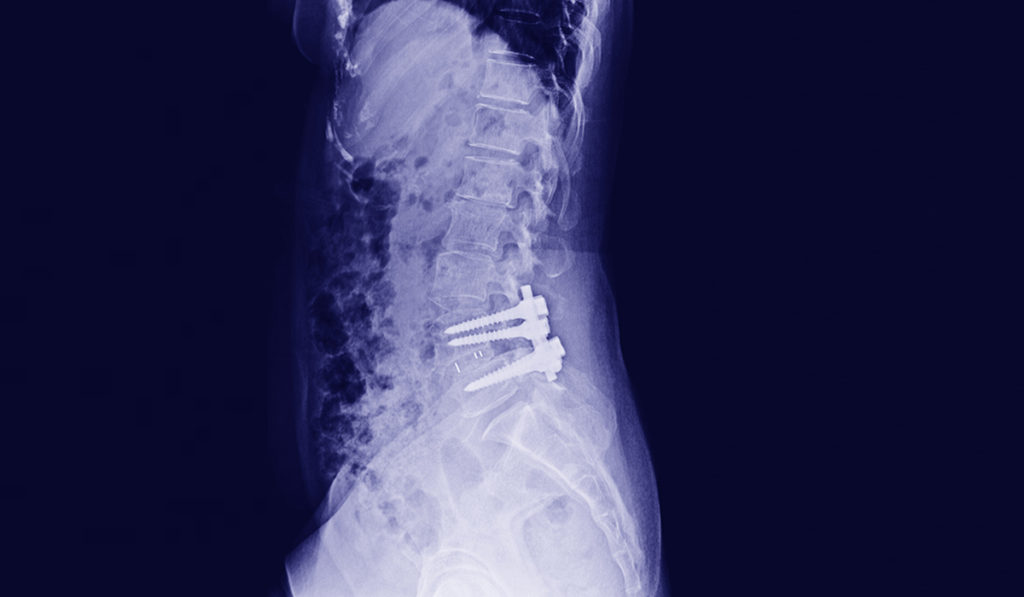Opioid-free elective spine surgery is both feasible and effective, according to a study recently published in The Spine Journal by Vanderbilt University Medical Center researchers Richard A. Berkman, M.D., assistant professor of neurological surgery; Amanda H. Wright, M.P.A.S., physician assistant in neurological surgery, and Ahilan Sivaganesan, M.D., a chief resident in neurological surgery.
“This is the first study to examine the complete elimination of opioids in spine surgery,” Berkman said. “The fallacy has been that patients’ postoperative pain must be managed with opioid analgesics. That thinking needs to change.”
“The fallacy has been that patients’ postoperative pain must be managed with opioid analgesics. That thinking needs to change.”
Opioid-free Management of Post-surgery Pain
The researchers developed a comprehensive program for opioid-free pain control after elective spine surgery, which they applied to 244 consecutive patients who had elective spine surgery with Berkman between January 2018 and July 2019. One-third of the patients underwent lumbar fusions.
In lieu of opioids, a multi-modal pain management protocol including ketoroloac, acetaminophen, cyclobenzaprine, gabapentin, judicious use of ice packs, and early ambulation was used.
The study included two phases: a preliminary period of opioid-minimization followed by a period in which complete opioid elimination was the goal. In the preliminary period, 47 percent of patients took no opioids in the first month after discharge. During the elimination period, 88 percent of patients took no opioids whatsoever, while experiencing satisfactory pain relief.
“Notably, of the 23 patients who were successfully weaned off opioids prior to surgery, 21 (91.3 [percent]) did not take a single opioid after leaving the recovery room,” the authors wrote.
Value of Education
Berkman and Wright, who have developed their opioid-free approach over 15 years working together, focus heavily on patient education and addressing any fears held by patients or their families. “We explain that we will prescribe plenty of pain medications, but not opioids, along with other effective interventions, like ice,” Berkman said.
Wright notes that nurses, whose performance is judged in part by how well their patients say their pain is controlled, also need education. If nurses ask why no pain medications have been ordered, Wright reassures them that Tylenol® and Toradol® are effective pain medications. She says she also goes out of her way to be readily accessible to bedside nurses.
“We explain that we will prescribe plenty of pain medications, but not opioids, along with other effective interventions, like ice.”
Reducing Opioids Before Surgery
Many participants successfully weaned off of opioids prior to their surgery with help from the researchers.
“When patients initially present as regular opioid users, we open up the concept that the opioids they are taking may be contributing to their pain,” Berkman said. He explains to patients that the dangers of opioids go far beyond issues of addiction. Opioids can make them more sensitive to pain, clouding the picture for their surgeon and making it difficult to be certain who is a good candidate for surgery.
“Some patients improve so much after opioid elimination that they don’t even need surgery,” Berkman said.
“Some patients improve so much after opioid elimination that they don’t even need surgery,”
An Approach Ready for Wide Adoption
Berkman believes in the generalizability of their approach to opioid-free spine surgery, although he cautions that patients who arrive taking high doses of opioids should be weaned off carefully.
“You don’t have to be a major academic center to institute this kind of protocol,” Berkman said. “Any spine surgeon can do this.”





